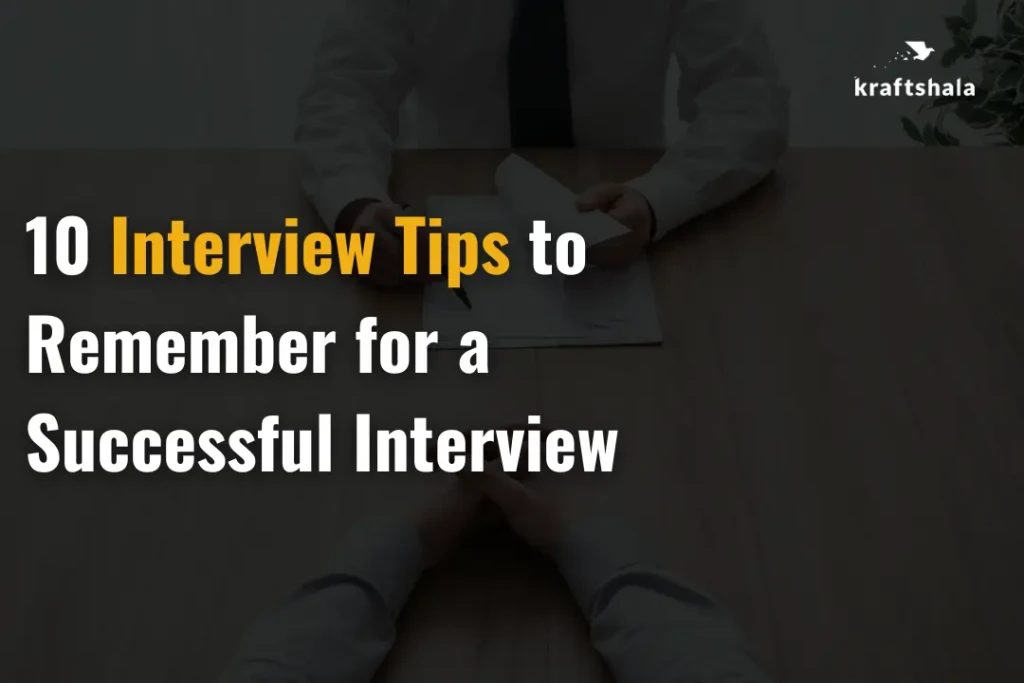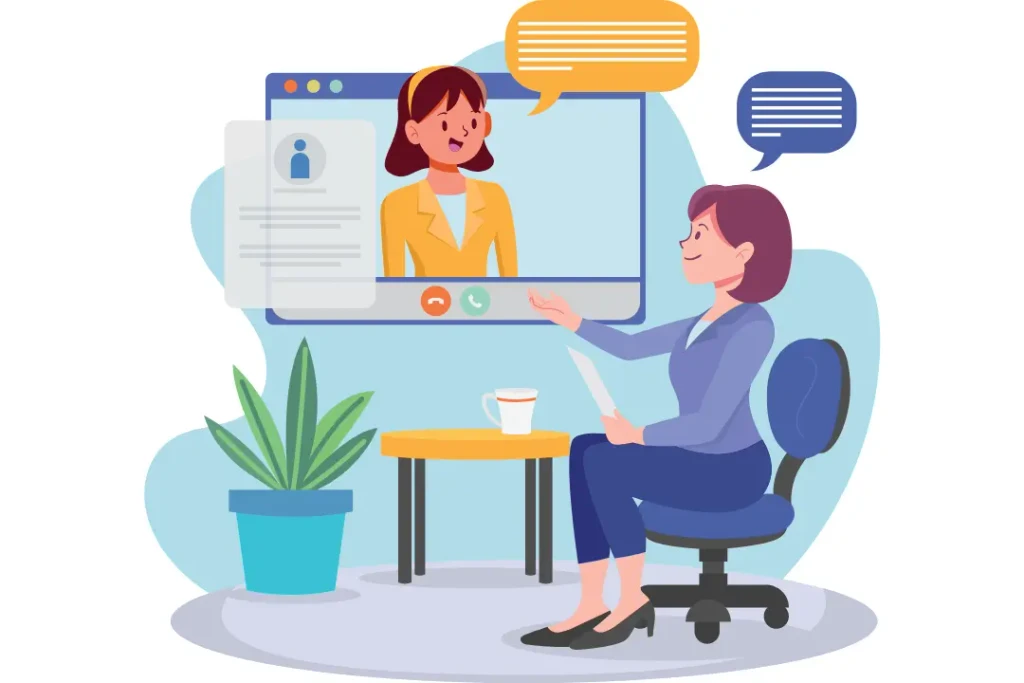10 Interview Tips to Remember for a Successful Interview
Table of contents
- Preparation is Key
- Show, don’t tell
- Be prepared with backstory
- Stay Calm Under Pressure
- Remote Interview Tips
- Practice Answering Interview Questions
- Promptly Tackle Assignments:
- Clarify your questions with the interviewer
- Follow up on questions asked during the interview
- Prepare Thoughtful Questions to Ask
Feeling anxious about interviews? Sweaty palms and nervousness kicking in right before? Oh, I totally get it! I remember my first interview for a content writer role—I was flooded with thoughts, wondering what they’d grill me about for a whole hour! And even if it was just a 15-minute interview, I felt the pressure. Sounds crazy, doesn’t it?
And guess what? I still feel those nerves, whether it’s a long interview or a short one. My mom’s always there, telling me to quit the drama and stay focused, reassuring me to give it my best shot.
But here’s the thing: no matter how skilled or prepared you are, if you can’t effectively showcase those abilities, it’s all for naught. Let me show you how to turn those overwhelming thoughts into confidence.
Let’s explore ten essential interview tips together that will boost your confidence to ace interviews.
Preparation is Key
Well, when it comes to interviews, there’s a three golden rule …
- Be prepared!
- Be prepared!
- Be prepared!
“33% of bosses claim they know if they will hire someone within the first 90 seconds of their interview” – CareerGeek
Interviewers can tell when someone shows up unprepared and are quick to write off anyone who hasn’t done their research beforehand.
So how can you prove you are prepared?
Research:
About company:
One of the most crucial interview skills is researching a company. It helps us understand if we’re a good fit for the company and the role, and vice versa! By thoroughly preparing and exploring their website and social media pages like Instagram, Facebook, and YouTube, we can learn about the company’s mission, vision, culture, recent projects, and achievements. This knowledge equips us to incorporate relevant information into our answers during the interview, showing that we’re thoughtful, well-prepared, and genuinely interested in joining their team.
About Job Description:
Read JD twice and thoroughly to analyse what the employer is looking for in a candidate. Identify the required skills and qualifications and reflect on how your background and experiences align with these requirements. Think about specific examples from your past work or projects that demonstrate these skills. Understanding the job description also helps you anticipate potential interview questions and prepare thoughtful, relevant answers.
Show, don’t tell
During an interview, simply stating that you’re a good team player or skilled at time management won’t cut it. What really sets you apart is illustrating your abilities with real-life examples that showcase why you’re the perfect fit for the role.
The best way to respond is by providing context for the situation and explaining how you dealt with it. This is where the STAR method comes in handy. Let me break it down for you:
S – Situation: Describe the context or scenario you were in.
T – Task: Explain the specific task or challenge you faced within that situation.
A – Action: Detail the actions you took to address the task or challenge.
R – Result: Share the outcome of your actions and any impact it had.
Using the STAR method allows you to frame your answers in a way that impresses the interviewer and effectively communicates your skills and experiences. It’s not just about what you say, but how you say it that makes all the difference.
For instance, instead of saying, “I am a team player”, consider telling the interviewer about an experience where you led a group effort to success. Saying, “I served as a team lead at my last job and was able to raise productivity rates by 20% in my time there” sounds impressive and shows the interviewer you were able to bring about positive results. If you have limited work experience, use examples from volunteer work or school.
Be prepared with backstory
When starting an interview, nailing your backstory is crucial. You’re the expert on your work history, but summarising it can be tricky.
Before the interview, outline your professional journey briefly. Focus on key positions and experiences relevant to the job. Practice speaking it aloud until it feels natural and confident. You aim to appear friendly and authentic, not robotic. This preparation sets you up for a strong start and a positive impression.
Stay Calm Under Pressure
Interviews can feel like pressure cookers, but it’s crucial to keep your cool, even when faced with tough questions or unexpected twists. Take a deep breath, centre yourself, and approach each question with poise and clarity. Remember, it’s okay not to have all the answers – what matters most is how you handle yourself under pressure.
Here are a few things you can do to stay calm and composed:
Take a deep breath: When you feel overwhelmed, pause for a moment and take a deep breath. It can help calm your nerves and center your focus.
Focus on the present: Instead of worrying about what might happen or dwelling on past mistakes, focus on the present moment. Pay attention to the interviewer’s questions and respond thoughtfully.
Remind yourself it’s okay not to have all the answers: Nobody expects you to know everything. If you encounter a question you’re unsure about, it’s okay to take a moment to think before responding.
Maintain good posture and body language: Sitting up straight and maintaining positive body language can not only make you feel more confident but also convey professionalism to the interviewer.
Remote Interview Tips
Phone or video interviews are the most common interviews lately. Although everyone is familiar with the frustration of technical difficulties, a bad connection, dim lighting, or a noisy background can distract from the great impression you’re hoping to make.
Ace an interview (even from a distance) with the following remote interview tips:
- Find a clean, uncluttered background.
- Sit where there is better lighting
- Make sure your webcam is at eye level.
- Try to make sure you’re in a quiet space. Make sure your mobile phone is silent before going.
- Do a practice run with a friend via video to make sure everything goes as planned.
Practice Answering Interview Questions
Prepare your answers for common interview questions such as:
- Tell me about yourself and why you are interested in this role.
- Why should we hire you?
- What do you know about our company?
You might also have to answer some tough interview questions, such as:
- What are your greatest strengths and weaknesses?
- Tell me about a time when you failed?
- Why do you want to leave your current job?
Practising helps you articulate your thoughts clearly and confidently. However, avoid memorising answers, as it can make you sound robotic. Instead, focus on key points you want to convey and practise speaking about them in a conversational manner. This preparation can reduce anxiety and improve your ability to think on your feet.
Promptly Tackle Assignments:
If the interviewer asks you to submit a project after the interview, do your best work but do it quickly. Turning in an assignment promptly shows that you’re invested in the hiring process.
If you and another interviewee are both being seriously considered, submitting quality work with a quick turnaround time could help identify you as the ideal candidate for the job.
Some questions to ask before taking assignment to stay informed:
- Could you provide more context or specific guidelines for the assignment?
- What are the key criteria or success factors you’ll be evaluating?
- Is there a preferred format or structure for the assignment?
- Is there a deadline for submitting the assignment?
- Are there any specific resources or references I should consider?
- Where do I have to submit this assignment?
Remember, asking these questions not only clarifies things for you but also shows the interviewer that you’re engaged, detail-oriented, and ready to tackle the challenge!
Clarify your questions with the interviewer
The most common problem in interviews is that they’re afraid to ask questions if they don’t understand something. This can lead to giving a response that doesn’t answer the question and leaves the interviewer hanging.
If you don’t completely understand a question or feel unsure about what the interviewer is asking, feel free to ask for clarification! Questions are a way for the interviewer to get to know you, but it only works if you understand what they’re asking. Many interview questions can be interpreted in multiple ways, so don’t feel shy about voicing any questions you have.
Follow up on questions asked during the interview
If you can’t answer a question, don’t forget to follow up. Keep your promise to provide the answer after the interview. It may be tempting to assume they’ll forget about it. They might. But, following up shows that you gave the question the attention it deserves. It also gives you an extra chance to remind them of your interest.
Prepare Thoughtful Questions to Ask
Some might think asking questions in the interview is a mistake. But, not asking questions shows that you’re less interested. This is one of the most important job interview tip. It can help you stand out from other candidates. Have a set of questions ready to ask the interviewer to show your interest in the role and the company. Your questions should show that you researched. And that you are thinking critically about the opportunity.
Ask about specific aspects of the job, team dynamics, company culture, or future projects. Here are some questions you might consider asking your interviewer:
- Can you describe the day-to-day responsibilities of this role?
- What are the company’s values, and how do they influence decision-making and operations?
- How would you describe the work environment here?
- Are there opportunities for professional development or further education?
- How does the company support work-life balance?
Working on these ten interview tips – preparation, research, show don’t tell, be prepared with backstory, stay calm under pressure, remote interview preparation practice answering interview questions, promptly tackle assignments, follow up on questions asked during the interview, prepare thoughtful questions to ask – will not only boost your confidence but also position you for interview success. Interviews are opportunities to showcase your unique talents and shine brightly – so go out there and dazzle them with your brilliance! You’ve got this!

















